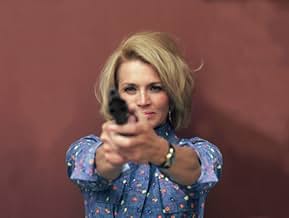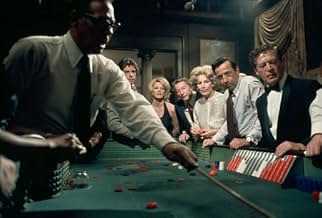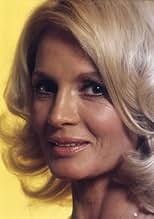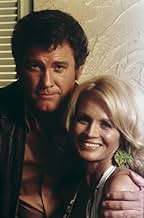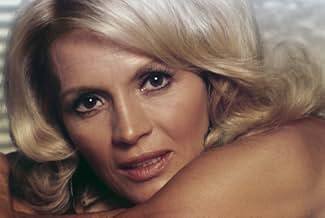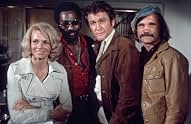VALUTAZIONE IMDb
6,6/10
2573
LA TUA VALUTAZIONE
Sergente "Pepper" Anderson lavora nel lato selvaggio della strada, dove si atteggia a qualsiasi cosa, dalla bambinaia di un gangster a una passeggiatrice di strada fino a un detenuto.Sergente "Pepper" Anderson lavora nel lato selvaggio della strada, dove si atteggia a qualsiasi cosa, dalla bambinaia di un gangster a una passeggiatrice di strada fino a un detenuto.Sergente "Pepper" Anderson lavora nel lato selvaggio della strada, dove si atteggia a qualsiasi cosa, dalla bambinaia di un gangster a una passeggiatrice di strada fino a un detenuto.
- Candidato a 7 Primetime Emmy
- 2 vittorie e 15 candidature totali
Sfoglia gli episodi
Recensioni in evidenza
10getjezz
This started a movement in TV crime shows where females weren't just the passive victims of male dominated fantasy crimes. This lady hit back. And what a punch she packed. An action packed series that introduced us to some great supporting characters and kept mums as well as dads on the edge of their seat. Angie Dickinson never camped it up (as much as you couldn't in the 1970's) It was as gritty as the execs would allow. Despite the pilot episode being called Police Story - it was obvious from the outset who the star of the show was.
In its prime I had reached the grand old age of 10 - whereby this was the first adult TV series I was allowed to stay up and watch. Thanks Mom & Dad
In its prime I had reached the grand old age of 10 - whereby this was the first adult TV series I was allowed to stay up and watch. Thanks Mom & Dad
After I graduated from college, had a job, I'd sit in my single-girl's apartment, watching this show about a single woman working. In 1977-1978, the network would show Policewoman, Kojak and another cop show after the late night news. Angie was right up there with the boys. That pretty much sums up her image. Pepper liked being one of the guys. The media focused on her sexy qualities, especially the first half of the first season, but Pepper really evolved into a great character. The topics were often ahead of their time. I remember one episode that began with Pepper and her boss watching that French dance act where the man slaps the woman around. Pepper didn't like it. Darned if a new neighbor in her apartment complex stops by, showing signs of being slapped around. Spousal abuse! This was before Farrah Fawcett starred in the TV movie, "The Burning Bed", the TV movie that brought this issue to the mainstream. In two other episodes, Pepper supported the wife or ex-wife of one of her coworkers diagnosed with cancer. The '70's were a decade when women ceased to hide their medical ailments, including disfiguring ones like breast cancer. These episodes showed that the Police Woman supported women as well as men. Back to Pepper's apartment, it was one a city employee could afford, unlike the spectacular, designer decorated living quarters one usually sees like in Will & Grace, Living Single, etc.
This definitely was the first cop show to feature a female in the lead. Angie Dickinson was quite convincing as the tough no nonsense Pepper Anderson and Earl Holliman was great as her fellow officer Bill Crowley. Within a few years, however, this show would later be upstaged by the more light-hearted "Charlie's Angels" and would later inspire that other female cop show "Cagney and Lacey". Too bad they don't show this on television anymore. It is definitely a lost classic.
In the Summer of 1975, not so long ago, this was the NUMBER ONE show on television, and was the TOP SHOW in many of the countries around the world in which it aired.
How many people know this? Today, almost nobody... Younger audiences haven't even seen it, or, in many cases, haven't even heard of it, or know it's success essentially inspired the advent of "Charlies Angels". (It was also TV's first successful drama series to feature a woman in the title role). When "Police Woman" premiered in fall 1974 it was, admittedly, a quite different show than it would end up four seasons later. Angie Dickinson was the slinky undercover cop, sexy but tough-- convincing on both fronts-- and the show was produced (in the beginning) with the very obvious idea in mind of doing something "good" and distinctive, while tossing in a dash of T&A in their for "kick".
Like with any show, in the very early episodes the series is trying to find it's identity, but by the last half of the first season, the show had taken on almost a cinematic sense of bigness that was REALLY working-- the show (at least for the standards of the day) had begun to feel like a movie, full of gravity and portend, decidedly not just another cop show and not just an undercover-hooker formula thing (although they didn't shy away from that). No wonder the show was, briefly, at the top of ratings at this time-- or in the summer reruns immediately following.
But the feminists, Goddess bless 'em, put a lot of pressure on the network about "Police Woman", unhappy with the go-go dancer assignments and the "oooo-ain't-she-sexy!" dialogue that sometimes permeated the program. They wanted the character de-sexualized... Perhaps one can understand their point about that, but all they seemed to see was Angie in spandex and fishnets, and some of their demands were rather odd (prior to the second season, they even demanded that "Pepper" only be shot by female assailants in the future.... Huh?!?!?... Since 99% of most gun violence is perpetrated by guys, this seemed a tad strange). In any event, as sophisticated and intelligent as "Police Woman" was becoming by the end of it's first year, it didn't really need the "sex-crutch" anymore anyway, yet excess caution was taken with the second year to "reign in" Angie's natural effervescent demeanor. Curiously, what turned-out happening was that the energy was sucked out of the star and the show very quickly, her character weakened considerably... and yet, the hooker assignments continued.
What?? Now we had the reverse of what should have happened.
Within 6 months "Police Woman" went from Number One in the Nielsen Ratings to, maybe, Number 30 (an unwise timeslot change didn't help). In fact, NBC kept moving the show so much one wondered if it was one of those 'let's-try-and-lose-it' type of corporate decisions.
Suffice it to say, the show never really recovered. Angie's confidence seemed surgically removed after the first year, and the scripts and direction followed suit; only about half the episodes from seasons 2 and 3 had enough energy and focus to really work, and even then there's a constant feeling of the program "holding back" --- or holding-back Angie. And season 4, the series' final, was largely a misfire... And in SUCH contrast to the dynamic, volatile first season--- well, it's like a completely different program.
And ever since a brief rerun period after it's initial network run, the show has been utterly buried--- like it never even existed!
How many people know this? Today, almost nobody... Younger audiences haven't even seen it, or, in many cases, haven't even heard of it, or know it's success essentially inspired the advent of "Charlies Angels". (It was also TV's first successful drama series to feature a woman in the title role). When "Police Woman" premiered in fall 1974 it was, admittedly, a quite different show than it would end up four seasons later. Angie Dickinson was the slinky undercover cop, sexy but tough-- convincing on both fronts-- and the show was produced (in the beginning) with the very obvious idea in mind of doing something "good" and distinctive, while tossing in a dash of T&A in their for "kick".
Like with any show, in the very early episodes the series is trying to find it's identity, but by the last half of the first season, the show had taken on almost a cinematic sense of bigness that was REALLY working-- the show (at least for the standards of the day) had begun to feel like a movie, full of gravity and portend, decidedly not just another cop show and not just an undercover-hooker formula thing (although they didn't shy away from that). No wonder the show was, briefly, at the top of ratings at this time-- or in the summer reruns immediately following.
But the feminists, Goddess bless 'em, put a lot of pressure on the network about "Police Woman", unhappy with the go-go dancer assignments and the "oooo-ain't-she-sexy!" dialogue that sometimes permeated the program. They wanted the character de-sexualized... Perhaps one can understand their point about that, but all they seemed to see was Angie in spandex and fishnets, and some of their demands were rather odd (prior to the second season, they even demanded that "Pepper" only be shot by female assailants in the future.... Huh?!?!?... Since 99% of most gun violence is perpetrated by guys, this seemed a tad strange). In any event, as sophisticated and intelligent as "Police Woman" was becoming by the end of it's first year, it didn't really need the "sex-crutch" anymore anyway, yet excess caution was taken with the second year to "reign in" Angie's natural effervescent demeanor. Curiously, what turned-out happening was that the energy was sucked out of the star and the show very quickly, her character weakened considerably... and yet, the hooker assignments continued.
What?? Now we had the reverse of what should have happened.
Within 6 months "Police Woman" went from Number One in the Nielsen Ratings to, maybe, Number 30 (an unwise timeslot change didn't help). In fact, NBC kept moving the show so much one wondered if it was one of those 'let's-try-and-lose-it' type of corporate decisions.
Suffice it to say, the show never really recovered. Angie's confidence seemed surgically removed after the first year, and the scripts and direction followed suit; only about half the episodes from seasons 2 and 3 had enough energy and focus to really work, and even then there's a constant feeling of the program "holding back" --- or holding-back Angie. And season 4, the series' final, was largely a misfire... And in SUCH contrast to the dynamic, volatile first season--- well, it's like a completely different program.
And ever since a brief rerun period after it's initial network run, the show has been utterly buried--- like it never even existed!
Here's another example of a higher plane of quality 70's crime drama. Police Woman has much more believable scenarios, and better actors, say to other shows around that time, or T.J Hooker, if you want another example. The casting was something I really liked with this show. What actually pi..es me off here, is that of the measly screen time of the great Charles Dierkop, the older moustached guy of the undercover squad. He was the killer/cop in that good sleazy exploitation pic, Roots Of Evil. Again, here was a show where you saw a lot of 'before they were famous' actors, one being T.J Hooker, himself. Of course, the foxy AD as the female cop heroine, one lady cop you'd really like to save you, probably the best female acting cop performance to other ones around that time. The t.v. show's music score, is something I probably remember most, about this great cop show, as I was only a nipper. Another 70's cop show, gone, but not forgotten.
Lo sapevi?
- QuizAngie Dickinson admits in interviews that making this show was a bad experience, and she would not do it again if she had it over to do again but she still like the show.
- ConnessioniFeatured in The 27th Annual Primetime Emmy Awards (1975)
I più visti
Accedi per valutare e creare un elenco di titoli salvati per ottenere consigli personalizzati
- How many seasons does Police Woman have?Powered by Alexa
Dettagli
- Data di uscita
- Paese di origine
- Lingua
- Celebre anche come
- Police Woman
- Luoghi delle riprese
- Aziende produttrici
- Vedi altri crediti dell’azienda su IMDbPro
Contribuisci a questa pagina
Suggerisci una modifica o aggiungi i contenuti mancanti

Divario superiore
What is the French language plot outline for Pepper Anderson agente speciale (1974)?
Rispondi

